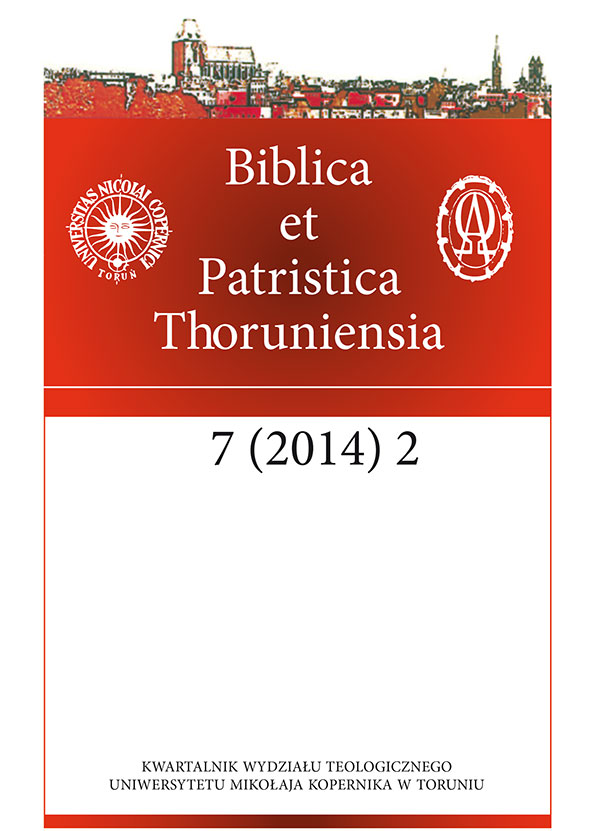The tree of knowledge of good and evil and the concept of God as creator in Gen 2,4b–3,24
DOI:
https://doi.org/10.12775/BPTh.2014.010Keywords
Gen 1, 1–2, 4a, Gen 2, 4b–3, 24, the Yahwist concept of God as creator, the tree of knowledge of good and evil, the origin of evilAbstract
The Yahwist tradition of the creation of man and his rebellion against the Creator (Gen 2,4b–3,4) is one of the most analysed biblical texts, but it is still the current challenge for exegets and theologians due to the unique literary, theological and cultural context. The relationship between two biblical traditions of the creation of humanity and the universe (Gen 1,1–2,4a; Gen 2,4b–3,24) and their possible links with similar texts of the ancient Near East is still an open exegetic problem which demands literary and theological studies. Despite the large number of publications on biblical prehistory persisted in (Gen 1–11), the relevant theological explanation demands first of all the image of the Creator presented in the Yahwist tradition – and his relationship with the creatures that at a certain stage of their prehistory fall into the influence of evil. The main issue of this publication will be the conception of God as creator and his relationship against evil seen in the perspective of the theological image of the Yahwist tree of knowledge of good and evil.
References
Achilles E., Male, maligno, w: L. Coenen, Dizionario dei concetti biblici del Nuovo Testamento, Bologna 1991, s. 949.
Bailey J., Initiation and the Primal Woman in Gilgamesh and Genesis 2–3, JBL 89 (1970) 144–147.
Cassuto U., A Commentary on the Book of Genesis, Jerusalem 1961.
Clark W. M., A Legal Background to the Yahwist’s Use of ‘Good and Evil’ in Genesis 2–3, JBL 88 (1969), s. 266–278.
Clines D., The Tree of Knowledge and the Law of Yahweh, VT 24 (1974), s. 8–14.
Coats G., The God of Death: Power and Obedience in the Primeval History, Int 29 (1975), s. 227–239.
Dziadosz D., Tak było na początku… Izrael opowiada swoje dzieje, Przemyśl 2011.
Engnell I., “Knowledge” and “Life” in the Creation Story, w: M. Noth, D. Thomas, Wisdom in Israel and in the Ancient Near East, FS. H. Rowley, VT.S 4, Leiden 1960,
s. 103–119.
Gaebelein F., Genesis, EBC 2, Grand Rapids 1990.
Gordis R., The Significance of the Paradise Myth, AJSL 52 (1936), s. 86–94.
Gordis R., The Knowledge of Good and Evil in the Old Testament and the Qumran Scrolls, JBL 76 (1957), s. 123–138.
Gordon C., The Ancient Near East, New York 1965.
Hamilton V., The Book of Genesis, Chapters 1–17, NICOT; Grand Rapids 1990.
Honeyman A., Merismus in Biblical Hebrew, JBL 71 (1952), s. 11–18.
Keil C., Delitzsch F., Commentary to the Old Testament, t. I: Pentateuch, Peabody 1961.
Krašovec J., Der Merismus in Biblischen-hebraischen und Nordwest-semitischen, Rome 1977.
Lemański J., Księga Rodzaju. Rozdziały 1–11, NKB 1.1, Częstochowa 2013.
Levin A., The Tree of Life. Genesis 2,9 and 3,22–24 in Jewish, Gnostic and Early Christian Texts, Harvard 1966.
Magonet J., The Themes of Genesis 2–3, w: P. Morris, A Walk in the Garden, JSOT.S 136, Sheffield 1992, s. 39–46.
Mettinger T., The Eden Narrative. A Literary and Religio-historical Study of Genesis 2–3 Winona Lake 2007.
Millard A., The Etymology of Eden, VT 34 (1984), s. 103–106.
Müller H., Mythische Elemente in der jahwistischen Schopfungserzahlung, ZTK 69 (1972), s. 259–289;
Nihan C., Römer T., Le debat actuel sur la formation du Pentateuque, w: T. Römer, Introduction a l’Ancien Testament, Geneve 2004, s. 93–98.
Oden R.A., Divine Aspirations in Atrahasis and in Genesis 1–11, ZAW 93 (1981), s. 212–213.
Rad von G., Genesis, OTL; Philadelphia 1972.
Reicke B., The Knowledge Hidden in the Tree of Paradise, JSS 1 (1956), s. 193–201.
Reventlow H., Hoffman Y., The Problem of Evil and its Symbols in Jewish and Christian Tradition, New York 2004.
Schmidt W., Die Schopfungsgeschichte der Priesterschrift. Zur Uberlieferungsgeschichte von Genesis 1:1–2:4a und 2:4b—3:24, WMANT 17, Neukirchen-Vluyn 1970.
Skinner J., A Critical and Exegetical Commentary on Genesis, Edinburgh 1910.
Speiser E., Genesis: Introduction, Translation, and Notes, AB 1; New Haven 2008.
Stordalen T., Echoes of Eden. Genesis 2-3 and Symbolism of the Eden Garden in Biblical Hebrew Literature, CBET 25, Leuven, 2000, s. 215–249.
Uehlinger C., Genese 1–11, w: T. Römer, Introduction a l’Ancien Testament, Geneve 2004, s. 116–119.
Vattioni F., L’albero della vita, Aug 7 (1967), s. 133–144.
Wallace H., The Eden Narrative, HSM 32, Atlanta 1985.
Walsh J., Genesis 2,4b–3,24: A Synchronic Approach, JBL 96 (1977), s. 161–177.
Walton J., Genesis, NIVAC 1, Grand Rapids 2001.
Wellhausen J., Prolegomena to the History of Ancient Israel, Edinburgh 1885.
Wenham G., Genesis 1–15, WBC 1; Dallas 1998.
Downloads
Published
How to Cite
Issue
Section
License
CC BY ND 4.0. The Creator/Contributor is the Licensor, who grants the Licensee a non-exclusive license to use the Work on the fields indicated in the License Agreement.
- The Licensor grants the Licensee a non-exclusive license to use the Work/related rights item specified in § 1 within the following fields: a) recording of Work/related rights item; b) reproduction (multiplication) of Work/related rights item in print and digital technology (e-book, audiobook); c) placing the copies of the multiplied Work/related rights item on the market; d) entering the Work/related rights item to computer memory; e) distribution of the work in electronic version in the open access form on the basis of Creative Commons license (CC BY-ND 3.0) via the digital platform of the Nicolaus Copernicus University Press and file repository of the Nicolaus Copernicus University.
- Usage of the recorded Work by the Licensee within the above fields is not restricted by time, numbers or territory.
- The Licensor grants the license for the Work/related rights item to the Licensee free of charge and for an unspecified period of time.
FULL TEXT License Agreement
Stats
Number of views and downloads: 2035
Number of citations: 0



